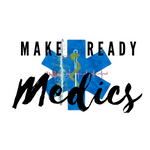There are several topics that make the paramedic student cringe; Pharmacology is near the top of the list. I believe there are several reasons why. I think if we dissect these reasons we can come up with a successful study strategy. The reasons I hear students struggle falls right inline with the rights of medication administration. The number of those rights has changed a little bit over the years. Here is the most recent I’ve heard:
- Right medication
- patient (or reason for administration)
- Right route
- right dose
- right time
- Right documentation
Out of this list we need to concentrate or the right patient, route dose and order. Students also need to know what the right response and what can go wrong. With most prehospital settings using over 30 different medications, this could seem like a daunting task. This article will give some of the best strategies for mastery of pharmacology. The most important thing that will help is to educate yourself.
The best and most beneficial strategy for pharmacology is a simple one. Look at the medications with a mentor. Not just your preceptors but your co-workers. Go through them while getting quizzed. Ask questions and flip through the protocol. A great mentor will ask you the names of the meds, its actions, indications, contraindications and dosage. Are there any tricks to the medication? Example ativan is a very thick oil based medication. A small needle makes it really hard to draw up. Or don’t give lasix too fast or the patients ears will ring. By the end of your paramedic program you should be able to rattle off all the medication information the mentor puts in your hand. Look at medication is supplied and the protocol, do they correlate? Scenarios when you get to capstone will help as well.
The second is flash cards. Good old fashioned flash cards. Flip through them every chance you get. Making them on your own will also help. The physical act of writing them out helps. Try not to use someone else’s flash cards.
Get a great reference book. Many paramedic programs provide them. My favorite one is Prehospital Emergency Pharmacology A good pocket reference is another option to review. Look at it often. Instead of playing on your phone while your in the restroom bust out a pocket guide. Learning meds builds on itself with compound interest. a good pocket guide is EMS Field Guide, ALS Version.
Get comfortable with medication math. Do some practice with a mentor. A great book for medication math is EMS Dosage Calculation: Math Review and Practice for Paramedics.
Lastly, if you hear the name of a medication you’re not familiar with, look it up. A quick google search after a call can be really enlightening. Use the resources you have available. It will take some time and effort but it will pay off in the end.
